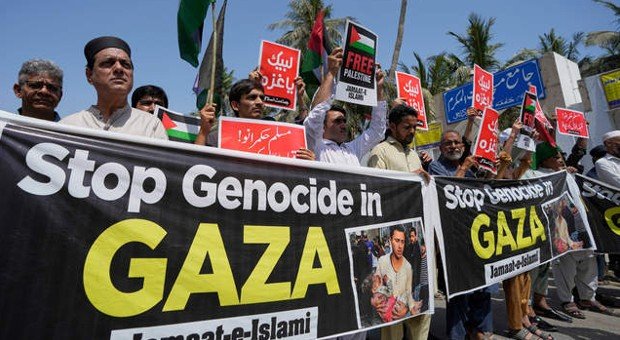Anti-Israel sentiment is intensifying in South Asia’s Muslim-majority nations amid the ongoing Gaza conflict, with Bangladesh, Pakistan, and the Maldives making significant moves to voice their opposition. The region is seeing a dramatic rise in protests, diplomatic actions, and public demonstrations of solidarity with Palestine.
Maldives Bans Israeli Citizens Amid Gaza War
The Maldives has imposed a ban on Israeli citizens, signaling its “resolute solidarity” with the Palestinian cause. This decision, ratified by President Mohamed Muizzu, follows a parliamentary approval aimed at condemning the alleged atrocities committed by Israel against Palestinians.
The government’s official statement denounces the “genocide” and atrocities perpetrated by Israel, affirming the country’s commitment to Palestine. Additionally, President Muizzu launched a national fundraising campaign called “Maldivians in Solidarity with Palestine,” rallying local support for the Palestinian cause. Israel’s Foreign Ministry advised its citizens to leave the Maldives, citing potential difficulty in providing consular assistance.
The Maldives, known for its luxury resorts and scenic beaches, hosted about 11,000 Israeli visitors in 2024, but that number has plummeted by 88% in the first few months of 2025.
Bangladesh’s Reassertion of Anti-Israel Stance
In Bangladesh, anti-Israel sentiment has reached a boiling point, with over 100,000 people marching through the streets of Dhaka in protest. Demonstrators, carrying Palestinian flags and chanting slogans like “Free, Free Palestine,” decried Israel’s military actions in Gaza. Protesters also vented their ire against U.S. support for Israel, targeting the images of former U.S. President Donald Trump and Israeli Prime Minister Benjamin Netanyahu.
The protests, largely organized by opposition parties and Islamic groups, have turned violent, with demonstrators vandalizing establishments perceived to be linked to Israel, including several fast-food chains. Notably, the country has reinstated the controversial inscription on passports, which now reads, “This passport is valid for all countries of the world except Israel.” This policy was reinstated after being dropped in 2021 under the Awami League government, and it highlights the growing isolation of Israel in South Asia.
Pakistan’s Protests and Legislative Moves Against Israel
In Pakistan, which has no diplomatic relations with Israel, massive protests erupted in Karachi, with thousands demanding an end to Israeli military actions. The protests also targeted American fast-food outlets, accusing them of being complicit in Israel’s policies. In the same vein, Pakistan’s religious political party Jamaat-e-Islami held a large rally in Lahore, where they called for a united Muslim front against Israel’s actions.
Pakistan’s parliament has passed a resolution condemning Israel’s military assault on Gaza and urging the international community to hold Israel accountable for alleged war crimes. The resolution also called for recognizing Palestine as a full member of the United Nations, reflecting Pakistan’s longstanding stance on the Israeli-Palestinian conflict. Prominent Islamic cleric Mufti Taqi Usmani has called for a complete boycott of Israel by the Muslim world, adding momentum to the growing anti-Israel sentiment across the country.
Impact Across South Asia
These developments in the Maldives, Bangladesh, and Pakistan reflect a broader wave of anti-Israel sentiment sweeping through South Asia’s Muslim-majority nations. Governments and civil societies are expressing increasing support for Palestine, and public anger against Israeli actions continues to mount.
The increasing protests and diplomatic gestures come amid a broader regional shift, with many citizens and political groups in South Asia aligning themselves with Palestinian aspirations for independence and justice. This surge in anti-Israel sentiment underscores the deepening divide over the Gaza conflict, with countries in the region signaling their opposition to Israeli policies, often at the expense of diplomatic ties with the West and Israel’s regional allies.
As the conflict continues, South Asia’s Muslim-majority nations appear increasingly resolute in their stance on Israel, and their growing political and public demonstrations signal a shift in the geopolitical dynamics of the region.


